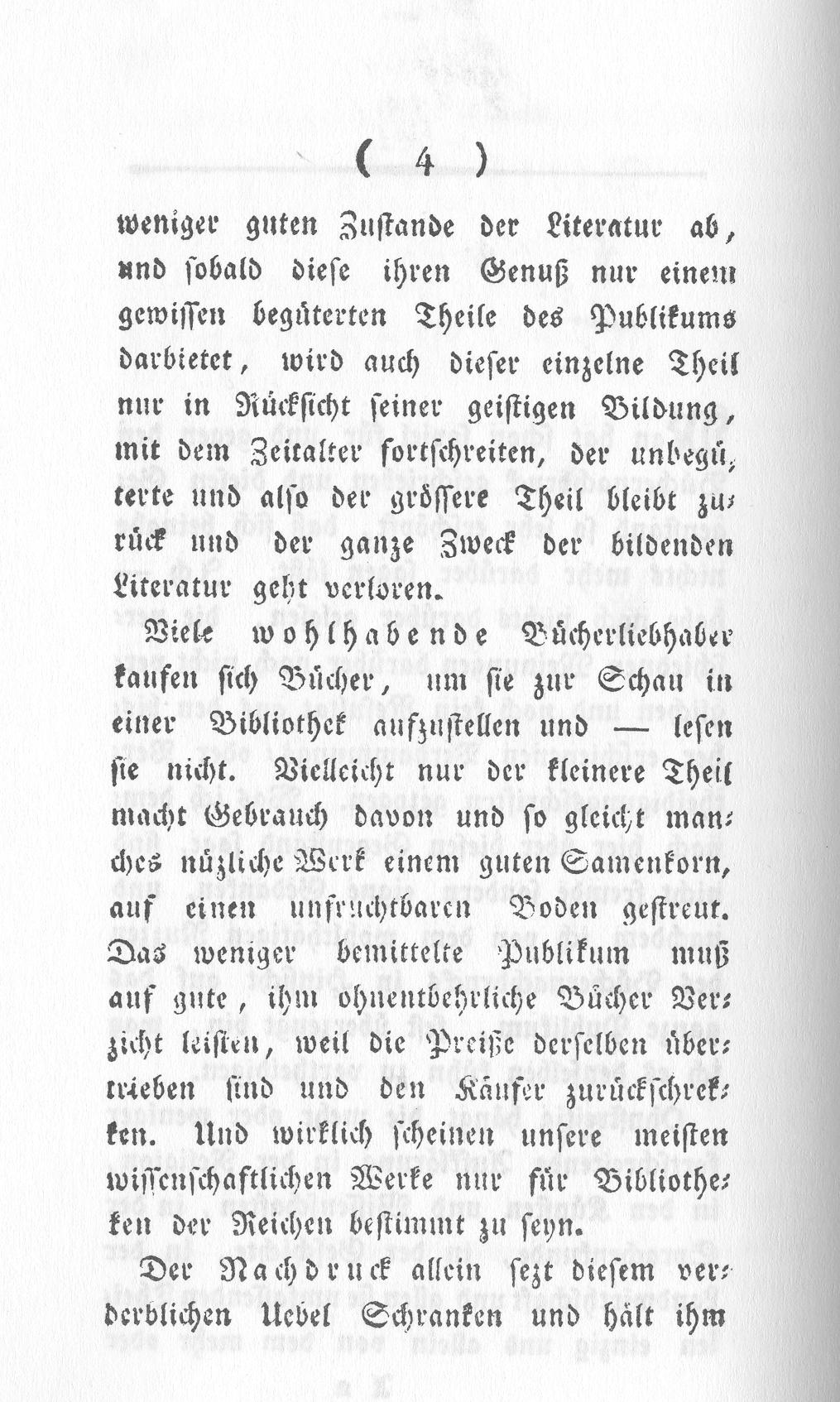PRIMARY SOURCES
ON COPYRIGHT
(1450-1900)
Browse Documents By...
Original Language...
Documents For...
Browse Commentaries By...
Browse Referred Persons By...
Kehr: Apology of the Reprinting of Books, Kreuznach (1799)
Source: Scanned from a reprint edition (edited by Reinhard Wittmann, München 1981) taken from an the copy held in Universitäts- und Stadtbibliothek Köln
Citation:
Kehr: Apology of the Reprinting of Books, Kreuznach (1799), Primary Sources on Copyright (1450-1900), eds L. Bently & M. Kretschmer, www.copyrighthistory.org
Back | Record | Images | Commentaries: [1]
Translation only | Transcription only | Show all | Bundled images as pdf
(4)
less propitious state in which literature
finds itself, and as soon as enjoyment of
the latter is restricted to a specific
privileged group from amongst the public,
it will only be this individual group which
is able to keep abreast with progress, where-
as the non-privileged, that is, the greater
proportion of the public will be left behind,
meaning that the very purpose of instructive
and formative literature is completely lost.
Many well-off book-lovers buy
books, so that they can put them on display
on the shelves of their private libraries, but
they do not in fact read them. It is perhaps
really only a minority amongst them which
makes use of the books they have purchased,
and therefore many a useful work can be likened
to a healthy grain of seed which has unfortunate-
ly been scattered on barren soil. Less well-to-do
readers have to forgo any hope of acquiring
good books, which may in fact be indispensable to
them, simply because their prices are so excessive
as to deter any potential buyers. And, indeed,
most of our country's scholarly works seem to be
intended solely for the private libraries of
the rich.
It is reprinting alone which can curb this
baleful evil and counteract it.
No Transcription available.
Source: Scanned from a reprint edition (edited by Reinhard Wittmann, München 1981) taken from an the copy held in Universitäts- und Stadtbibliothek Köln
Citation:
Kehr: Apology of the Reprinting of Books, Kreuznach (1799), Primary Sources on Copyright (1450-1900), eds L. Bently & M. Kretschmer, www.copyrighthistory.org
Back | Record | Images | Commentaries: [1]
Translation only | Transcription only | Show all | Bundled images as pdf
(4)
less propitious state in which literature
finds itself, and as soon as enjoyment of
the latter is restricted to a specific
privileged group from amongst the public,
it will only be this individual group which
is able to keep abreast with progress, where-
as the non-privileged, that is, the greater
proportion of the public will be left behind,
meaning that the very purpose of instructive
and formative literature is completely lost.
Many well-off book-lovers buy
books, so that they can put them on display
on the shelves of their private libraries, but
they do not in fact read them. It is perhaps
really only a minority amongst them which
makes use of the books they have purchased,
and therefore many a useful work can be likened
to a healthy grain of seed which has unfortunate-
ly been scattered on barren soil. Less well-to-do
readers have to forgo any hope of acquiring
good books, which may in fact be indispensable to
them, simply because their prices are so excessive
as to deter any potential buyers. And, indeed,
most of our country's scholarly works seem to be
intended solely for the private libraries of
the rich.
It is reprinting alone which can curb this
baleful evil and counteract it.
No Transcription available.












